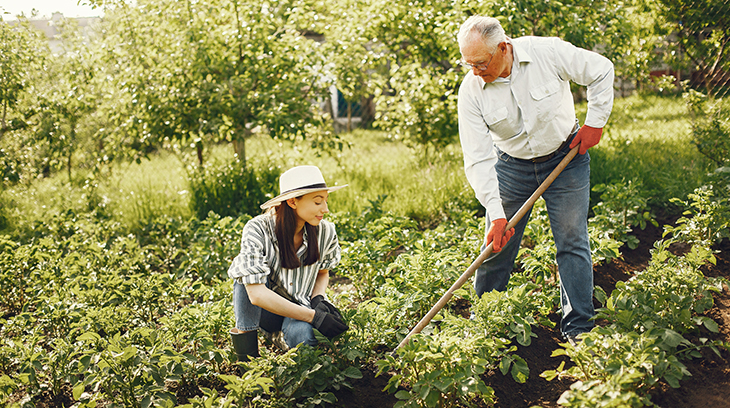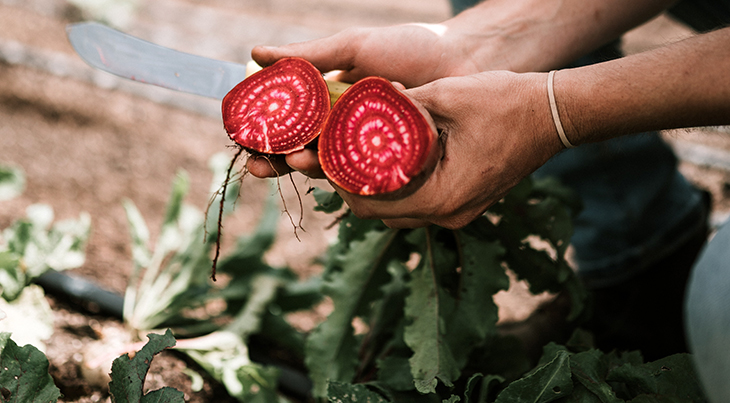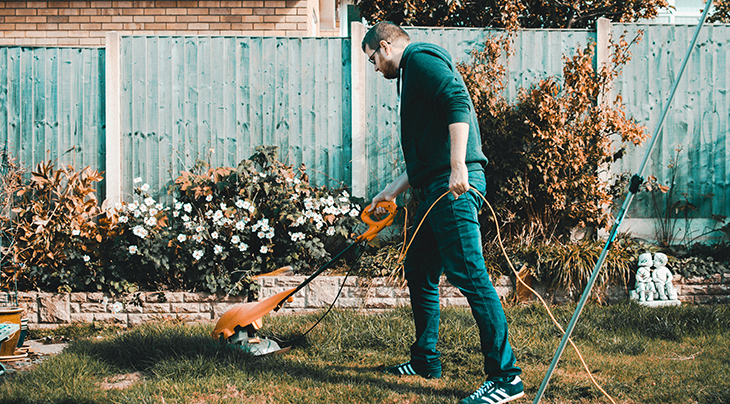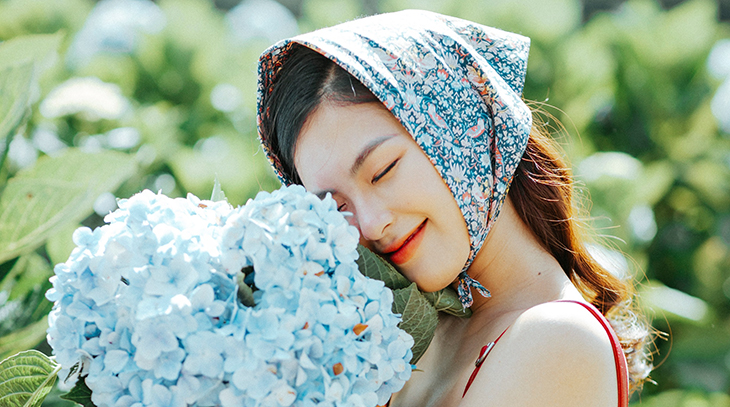12 Ways Gardening Helps Your Immune System
You might think that with advancements in science and technology, humans would beat all diseases. Unfortunately, that is not the case. Even with all of the innovations that have been introduced in recent decades, this progress has also brought stress, a hectic lifestyle, and for some people, chronic health problems.
The consequences of this may not be something people experience when they are young, but as we age, they can have quite an impact on our health. Having a good immune system may prevent certain problems that can impair your quality of life.
What is immunity, and why is it important?
The immune system is our defense line against pathogens that could make us sick and even have deadly consequences. It consists of cells and proteins that keep track of every microbe and create antibodies to fight them off. Without immunity, viruses, bacteria, parasites, and other attackers would take over our bodies and cause serious damage.
While immunization can help you stay safe, there are also other ways that can strengthen your health. Gardening is an activity that can improve your immune system, especially for older adults. After the age of 50, our bodies are slower to create antigens and respond fast enough to attacks.
Let’s see why gardening is a great approach to boosting your immunity.
1. Opportunities to socialize
Gardening is a perfect way to work on your socialization. If you don’t have a yard of your own, you can join a community garden and meet fellow gardeners. Start exchanging seeds and seedlings with your neighbors, or just ask them for some gardening tips. It’s a great way to meet new friends and socialize outside of the garden as well.
 (Family Gardening Photo: Gustavo F. Ring)
(Family Gardening Photo: Gustavo F. Ring)
Building relationships with other people can even create antibodies for some diseases. A study from the University of Miami found that beating loneliness and isolation can boost the immune system to fight off herpes. So, building friendships is not only good for your soul, it’s also good for your body.
2. Excellent source of Vitamin D
Vitamin D benefits numerous functions in your body. We all know it’s important for bone strength, but it does a lot more than that. It can lower the risk of certain types of cancers, multiple sclerosis, type 2 diabetes, and psoriasis.
While you can get Vitamin D from supplements and food, spending time in the sun is the best way. Make sure to wear 30+ SPF protection, a hat, and limit your exposure when UV radiation is the strongest – from 10 am to 4 pm.
3. Help with better sleep
People tend to sacrifice sleep for various reasons, but the fact is that they are sacrificing more than just rest. When we sleep, the body repairs and regenerates cytokines – proteins of the immune system. If you sleep less than you should or sleep poorly, you may disrupt the production of cytokines and compromise your defense against infections or inflammations.
Since gardening is a type of physical activity, it may exhaust and relax you enough to be tired and fall asleep the moment you lie down. Adults should have 7-8 hours of solid sleep every night to improve their immune system and overall wellbeing.
4. Improve cognitive functioning
Researchers from Japan reviewed several studies that investigated the effect of horticultural therapy on mental health. The results showed that it may be a useful tool to improve cognitive functioning and help people with dementia. Gardening is already used for this purpose in European Green Care programs, where people suffering from dementia spend their day working in the gardens and on the farms.
Having a strong immune system as we age can prevent or slow down the onset of dementia and Alzheimer’s disease. Macrophages from the immune system clean up brain plaque that causes these mental disorders. Immune-boosting may be the best approach to treat these diseases, and gardening can certainly be part of your strategy.
5. Build self-esteem
Self-esteem is a significant part of wellbeing no matter what age you are. If you don’t feel adequate, fulfilled, or capable, you may develop anxiety and depression. Strong self-esteem can encourage you to change your lifestyle for the better and be more responsible for your health.
Nothing boosts self-esteem more than a feeling of accomplishment, and you can have that by growing plants in your garden to maturity. If you’re new to gardening, start with easy-maintenance plants that don’t require too much work and/or special conditions. This will help you learn the basics and see what gardening entails. It’s hard to match the sense of satisfaction you feel when you admire a pretty flower, or eat a fresh fruit or vegetable, that you grew in your own garden.
6. Take control of what you eat
Food is a source of vitamins, minerals, proteins, and other nutrients important for the proper functioning of cells, organs, and tissue. However, not all food is good for us even if it’s generally considered healthy. The manner of cultivating vegetables and fruits can determine the quality of products you use in your everyday meals.
 (Family Gardening Photo: Taryn Elliott)
(Family Gardening Photo: Taryn Elliott)
Pesticides and other toxic chemicals used in agriculture can endanger your immune system and make it weak. As a gardener, you can grow your own food in an organic, eco-friendly, and completely natural way. Making compost, collecting rainwater, and manual weeding, are things that can make sure you have nutritious and healthy ingredients on your dinner table.
7. Gardening is a soothing experience
Untended gardens can be messy and chaotic; weeds grow everywhere, while plants tend to sprout leaves and branches in all directions. While that sounds stress-inducing, tending your garden can be a soothing experience and calm your nerves. Removing weeds, trimming plants, and deadheading flowers, is quite rewarding and will leave you with a sense of accomplishment.
Another great thing about gardening is that you will always have some decluttering to do. Not only will tidying up your great outdoors clear away potentially harmful elements to your heath, it can bring you joy and reduce stress. More importantly, it can minimize your exposure to allergens, bacteria, and toxic pathogens that can overwhelm your immune system.
 (Weed-eating the Gardening Photo: Lisa Fotios)
(Weed-eating the Gardening Photo: Lisa Fotios)
8. Connect to nature
A lot of research points out the connection between nature and good health. Some researchers believe that this happens because the greenery triggers our rest mode. This makes us feel safe, calm, and stimulates the production of feel-good hormones. People are often encouraged by health experts to take walks into the forest or spend some time in parks to boost their immune system.
Being surrounded by plants can lower the risks of certain chronic conditions that may weaken your immune system, like high blood pressure and obesity. You can have a theme to your garden, ie planting herbs, or vegetables, or certain types of flowers and bushes to attract birds Gardening takes you to an even higher level of connecting with nature, allowing you to become an active participant.
9. Daily dose of physical activity
It’s a little known fact that gardening is considered moderate physical activity. Based on the Centers for Disease Control and Prevention (CDC), gardening can burn around 330 calories in an hour. When you think about it, it makes sense. After all, using a water spray gun for plant washing and irrigation, digging with a shovel, or gathering leaves with a rake, can get your heart rate up.
While accelerated heartbeat can speed up metabolism and help you control your weight, it can also improve your immune system by increasing circulation. Blood carries important nutrients and oxygen to your organs and tissue that helps them to work properly, as well as white blood cells responsible for defense. Just like any other physical activity, gardening can elevate your breathing, flushing pathogens from your lungs, and raise your body temperature which may stop bacteria from thriving.
10. Natural mood boost
Spending time in your garden is a wonderful way to reduce anxiety and improve your mood. When under stress your body produces a hormone called cortisol. In small amounts, cortisol is actually good for your immune system, but chronic elevation can seriously affect your body’s defenses.
Moreover, soil contains the bacteria Mycobacterium vaccae, which can stimulate the production of serotonin. Serotonin is a happy chemical that not only works as an anti-depressant, but also can improve your immune system. The better you feel mentally, the more energy you will have to invest in yourself, and in taking care of your overall health.
11. Helpful for addiction recovery
If you are going through an addiction recovery program, you need all the help you can get. Or perhaps you just want to kick a habit that you know is bad for you. Gardening is a perfect rehabilitation activity that can help you minimize the stress of kicking your addiction. Smoking, alcohol, and other types of addiction weaken the immune system, leaving your body more prone to pathogens.
While quitting your bad habit may seem like the hardest step, resisting the urge to give up on your resolution is harder. Gardening gives your something to concentrate on and take your mind off your addiction. In time, as your garden thrives, your need for addictive stimuli will start to lessen.
 (Family Orange Gardening Photo: Văn Long Bùi)
(Family Orange Gardening Photo: Văn Long Bùi)
12. Bringing family closer together
The modern age and technology may have brought new means of communication to our lives, but in some ways it has hindered face-to-face relations. Sadly, this trend is also taking its toll on a family, especially when it comes to elderly members. However, having mutual interests and working on a shared goal, is excellent for bringing people together in business and at home. Family gardening can be a perfect activity to bring all generations closer together.
You and your family members can spend more time outside in the fresh air, doing something satisfying together, and being away from phones, computers, and tablets. Talking and exchanging stories can help everyone feel accepted and appreciated, bringing happiness and companionship. These positive feelings can inspire you to take better care of yourself and adopt healthy habits.
The bottom line
We live in a challenging time to be healthy. While that may sound frightening, it’s a perfect inspiration to take better care of our wellbeing. Gardening is one of the ways to make your life meaningful and reduce stress, which in turn can improve your immune system. Furthermore, you can control what you eat, make new friends, and be more physically active – all the precursors for enjoying good health.
*Photos are via Pexels.com. This article is for informational purposes only and is not intended as medical or mental health advice, nor is it a substitute for professional medical or mental health advice, diagnosis, or treatment. Always seek the advice of a qualified physician or mental health provider with any questions you may have regarding a medical or mental health condition. In the event of a medical emergency, call a doctor or 911 immediately. This website does not recommend or endorse any specific tests, physicians, products, procedures, opinions, or other information that may be mentioned on the Site or on other websites it links to. Reliance on any information provided by this website or other websites it links to, is solely at your own risk.*

